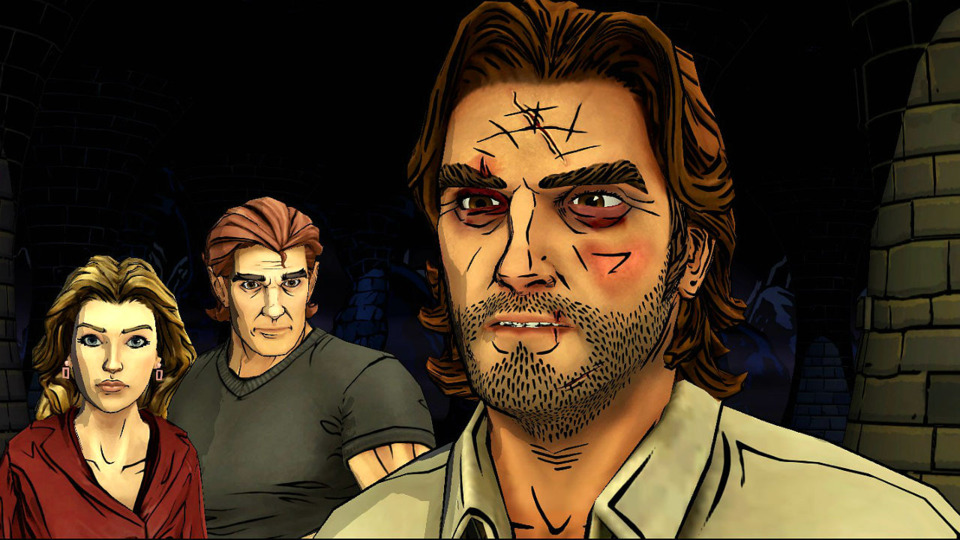
Editor's Note: As always, this is a spoiler focused recap of The Wolf Among Us' finale. If you haven't played this episode and intend to do so, don't read this!
I've had my share of issues with Telltale's first season of The Wolf Among Us. After a strong start, this fantasy-tinged police procedural progressively found itself having greater and greater trouble justifying its episodic structure. With each episode, the choices the player encountered seemed less and less vital, the investigation became less interesting the larger it grew in scope, and characters that made a strong impression early on began to disappear into the background. The Wolf Among Us essentially backed into its final episode, needing a strong, thoughtful conclusion to justify the diminishing returns of the last couple of episodes.
Fortunately, "Cry Wolf" delivers mostly that. Mostly.
"Cry Wolf" is at once a definitive end to the story arc that's been building since that severed head appeared on Fabletown's doorstep, and something of a non-ending, too. The murders Bigby and friends have been investigating are eventually solved, the Crooked Man and his criminal organization receive some measure of justice (depending on how you choose to proceed), and life in Fabletown eventually returns to a sort of normalcy; and yet, questions remain. Some of those questions are of the intentional variety, while others just feel like minor plot holes never addressed for the sake of narrative convenience. If your hope for The Wolf Among Us was that every loose thread would be tied up in a neat, purely satisfying way, "Cry Wolf" may leave you feeling a bit cold. Then again, if you've been playing The Wolf Among Us all this time and expecting some kind of simple, happy ending after everything that's taken place, you probably haven't been paying close attention.
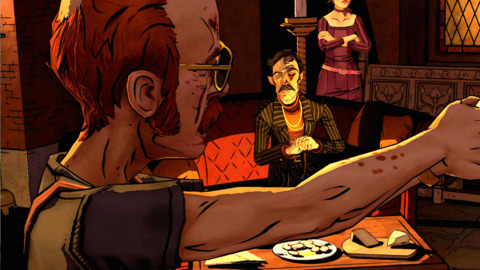
After all, nobody in The Wolf Among Us is exactly an innocent. Even the characters very much on the "right" side of the law will bend the rules, lash out in anger, and make truly terrible decisions. Bigby Wolf himself is no exception. All throughout this season, Bigby has had ample opportunity to commit acts of impulsive violence, to ignore the pleas for help from his friends and colleagues, and to just generally be a raging dick. For my part, I've tried to avoid those pitfalls wherever I could. I tried to only fight when attacked, to respond kindly to those who needed kindness, to help anyone I could. I wasn't always successful. That I chose to punch the Woodsman during his interrogation was a fact that some Fables refused to let me forget, and I made no secret of my contempt for anyone who willingly agreed to work for the Crooked Man's gang. But those few transgressions aside, I felt compelled to try and keep Bigby as a fairly upstanding character, even as the choices the game presented me with seemed increasingly pointless in the grand scheme of things.
As it turns out, those choices weren't as pointless as they seemed at the time. All along, Bigby's behavior has been tallied by the various people around him, just waiting for an opportunity to be thrown back at him in a moment of judgment. The first half of "Cry Wolf" is all about getting to that moment. The episode picks up where the last left off, with Bigby surrounded by the Crooked Man's goons in his lair. While I half expected this to be a drawn out scene, it's actually just a brief exchange before the Crooked Man implicates Georgie as the killer. He tries to wipe his hands of Georgie as quickly as he can, offering up a deal with Bigby to try and end this peacefully, but Georgie isn't having it. He flips out over being made the scapegoat, which sends everyone in the room into a frenzy. Suddenly Bigby is surrounded by numerous members of the gang, and it's an all out brawl as he tries to escape and pursue the Crooked Man, who dives through a nearby portal back into the real world. In the fray, one of the Tweedles is killed (or at least gravely injured--I can't be certain because they both disappear from the episode at this point), Jersey Devil goes down in a heap, and Georgie skips back to New York with Vivian. What follows is a tense chase scene, arguably one of the best action sequences Telltale has ever done. Bigby goes full werewolf here, leaping from rooftops onto cars and dodging and weaving through traffic.
For reasons I can't quite fathom, Georgie and Vivian end up back at the Puddin' and Pie, AKA literally the first place anyone would ever look for them if they were on the run. Bigby arrives just in time for a dying Georgie to lay plain his and Vivian's role in everything. The strippers at the club are all under a spell cast by Vivian (who reveals herself as the girl from the story The Green Ribbon--never mind that these ribbons are purple), which prevents them from ever speaking out against their employers. Meanwhile, Georgie did indeed kill both Faith and Lily, but on orders from the Crooked Man. For how long this scene goes on, you don't get a whole lot of vital info here. Vivian is not a character that has had much screen time in this series, so her big reveal felt a bit off. Likewise, when she expresses her guilt at it all and makes the decision to end her life, I didn't exactly react. I chose to let her decide for herself, because (grim as this sounds) I didn't really care that much. Georgie's dismay over her death didn't do much for me either, though I at least felt obligated to kill him off before leaving the club, if only because he did me the favor of telling me where to find the Crooked Man's hideout. I could have left him to die, but in keeping with how I've been playing Bigby all along, it just didn't feel right to do so.
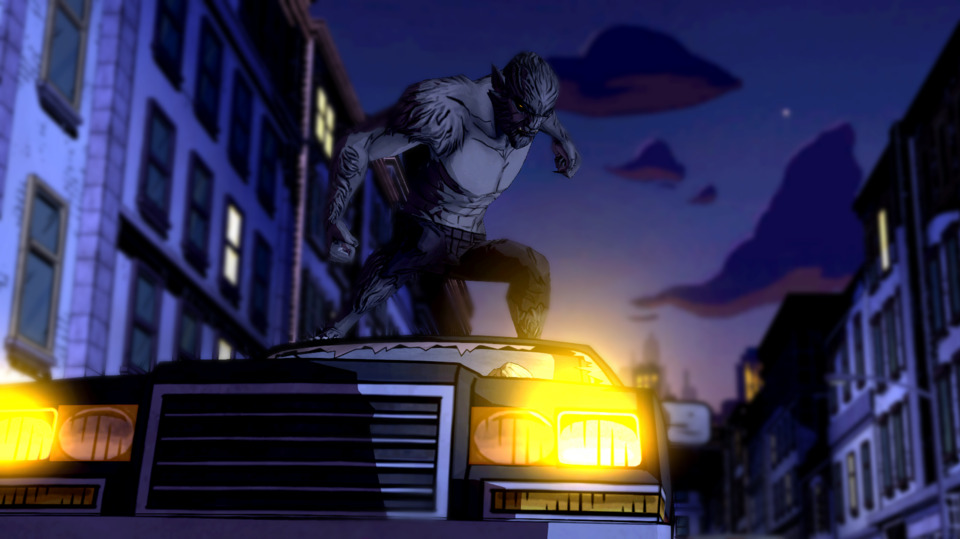
Finding the Crooked Man leads to another terrific action sequence. I know I've said action isn't typically Telltale's strong suit, but this series has managed to balance fights/chases with conversation/investigation in a terrific way. The final battle against Bloody Mary is no exception. Again, Mary isn't a character that's been well-defined in this series, but what definition she does have is definitively vile. So having the opportunity to kill her off not just once, but many times over was entirely satisfying. I say many times over because this battle owes at least a little bit of inspiration to that crazy fight in The Matrix: Reloaded with the hundreds of Mr. Smiths. Bloody Mary's EX attack is apparently to make tons of copies of herself, which surround and slash away at Bigby. That leads to Bigby getting angrier and angrier until he reaches his final form, which is literally a very big, very bad wolf.
Dispatching Mary gets you to the Crooked Man, and the moment you've probably been waiting for. He pulls a gun on you the second you walk into his office, but he expresses a willingness to cooperate, provided you bring him back to stand trial. Obviously, there is a ruse here. This guy is a charmer and a manipulator, and there's no way he'd agree to be arrested unless he thought there was a way out for him. Incidentally, you can choose to kill The Crooked Man right then and there, and the ending that plays out is considerably different from what happens if you bring him back alive. For my part, I found the ending where he stands trial far more interesting.
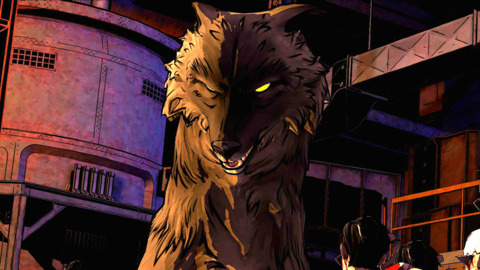
That's also the first choice I made (I went back and replayed to see what happened when I killed him), so that's the ending I'm going to recap here. As I said above, this is the moment where Bigby's actions throughout the season come into play. After the charges against the Crooked Man are read, he is given the opportunity to defend himself, and he does so by explaining exactly what I predicted he would in my recap of episode four. He talks at length about how the Fabletown home office abandoned its citizens and left them to fend for themselves, while he went out of his way to help those in need. He continues to pretend he had nothing to do with the murders, that Georgie acted alone. And when it's suggested that he should still be responsible for the actions of his employee, he presents the argument that so too should Bigby's actions reflect on Snow White, given that she is acting deputy mayor.
I imagine that if I had played Bigby a different (and much more violent) way, this argument might have held more water. As it is, the only infraction the Crooked Man is able to present here is the (mild) beating I gave the Woodsman--after all, I only hit him once. Additionally, apart from a bit of sarcasm, I'd chose to act kindly to nearly all of the Fables in the room--saving Auntie Greenleaf's tree, showing respect to the trolls during and after Lily's funeral, not beating the shit out of Beast when given the chance--meaning none of them had any real reason to hold a grudge against me. On top of that, the salient point is made that Bigby's infraction took place under Crane's leadership, so the point is sort of moot anyway.
Yet the Crooked Man continues down this path, and still somehow manages to start convincing the other Fables that maybe he should be found innocent. This, perhaps, is a symptom of writing a story with flexible outcomes. Because I mostly played Bigby to the letter of the law, there wasn't much ammunition for the Crooked Man to fire back at me with, yet the argument still had to take place in order for the story to progress as intended. This is something I really only noticed after finishing the episode. At the time, I appreciated the way the game opted to conclude its story by mixing your own behaviors into the trial. But in retrospect, the argument falls apart if you don't do enough to make it valuable. The idea of painting everyone's behavior (including Bigby's) in shades of grey is a good one, but it just doesn't hold up if you don't play the game a specific enough way.
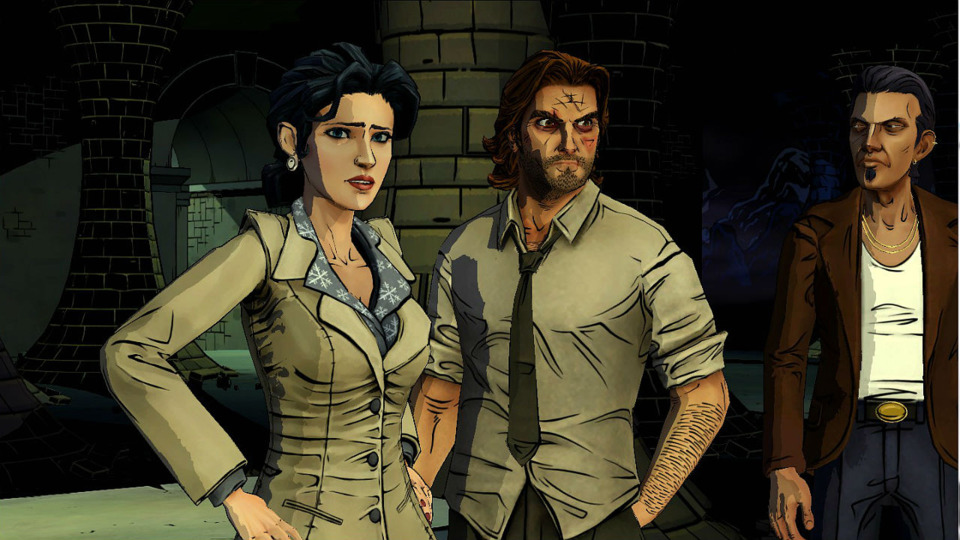
Regardless, the game eventually solidifies the Crooked Man's guilt irrespective of what you've done. When the Crooked Man finally resorts to pointing out that Bigby actually lacks any physical evidence of his guilt, Nerissa miraculously appears (now free of the spell that kept her from talking, thanks to Vivian's suicide) to say she was there when the Crooked Man ordered the girls' deaths. Her eyewitness testimony is all the citizens of Fabletown (or, at least, the ones relevant to this story) need to find the Crooked Man guilty. That brings up the question of how to punish him. Some want him tossed down the witching well, as is custom in Fabletown death sentences, while others want to use magic to imprison him.
Eventually the choice is laid on your shoulders. There's no way to please everyone, so you're faced with what at first feels like the most intense choice the game has yet given you. And then, right as you're about to deliver your decision, the Crooked Man goes and makes it easy for you. He attacks, trying to choke Bigby with his handcuff chain, though it takes little effort for Bigby to subdue him. Now you have the choice again, and I'm sorry, but if you chose to imprison him at this point, I don't know what you're doing. Fables evidently don't die unless killed, so imprisoning him for life means imprisoning him until the inevitable heat death of the universe. Why should a man so vile and manipulative be allowed to continue existing at the expense of the community, when he can just be done away with entirely? Granted, I decided to skip the more gruesome option of beheading him right then and there, and instead sent him plummeting down the well. Not everyone was happy, but at the very least, it seemed like some measure of justice had been exacted.
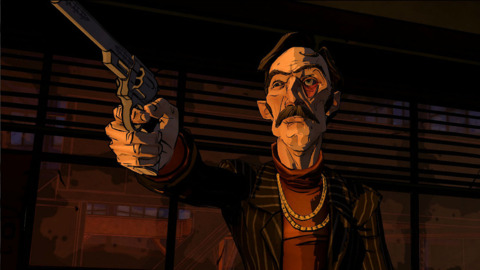
Of course, cleansing Fabletown of the Crooked Man's influence didn't exactly just set everything right. Once the case is resolved, life seemingly returns back to a sort of normalcy, albeit one that's far from perfect. Snow (who, apart from one great speech during the trial, barely appears in this episode) is now fully engaged as Deputy Mayor, and as such has little time to talk to Bigby amid all her paperwork and meetings. Though Colin seems to find a way to stay, Mr. Toad and his son are sent to the farm. Odd, given that I chose to give him the money he'd need for glamours in the last episode, but apparently Snow wouldn't acquiesce and let them stay. This is a point of some bitterness for Toad, so when his boy asked me to give Snow a gift for him (a colorful beetle from his collection), I didn't refuse.
All of what I've described here makes for a satisfying enough conclusion to an uneven, but generally entertaining season, but that's not all that happens. A final conversation takes place between Bigby and Nerissa, who is off to start a new life. This final stinger pulls the rug out from a number of previously held beliefs about the nature of the killings, the testimony she gave during the trial, and even the victims themselves. When all is revealed during this sequence, you'll be forgiven if you don't completely grasp what, exactly, the game has just told you. It's a reveal that will make sense to those who have paid close attention all season long, but if you're even remotely forgetful (as I tend to be with these sorts of episodic games), you may have the sudden urge to go back and play some of the earlier episodes to figure out what it all means.
This, again, is my biggest issue with The Wolf Among Us. There's a good detective story in here, one that is far more layered and tricky than it initially seems. However, with weeks stretching between episodes, it's been difficult to keep track of all the little details, not to mention maintain strong connections to the game's characters as they float in and out of the story. "Cry Wolf" closes out the season about as well as could be hoped for, given what took place in earlier episodes, but it doesn't land with quite the impact it seemingly could have due at least in part to its episodic structure. In the parlance of our times, perhaps The Wolf Among Us would benefit most from a "binge" play, which is to say playing all of the available episodes in quick succession, now that they're all out.
I'll touch on that more in my full review of the season, which I'll have written up soon. For now, I'll just say that "Cry Wolf" made me feel better about this first season of The Wolf Among Us, especially after its lackluster middle episodes. It won't please everyone, but it gives the level of closure a good finale should, and leaves just enough open to pique my interest in what might happen in future seasons, which I'll just go ahead and assume Telltale is probably planning for.
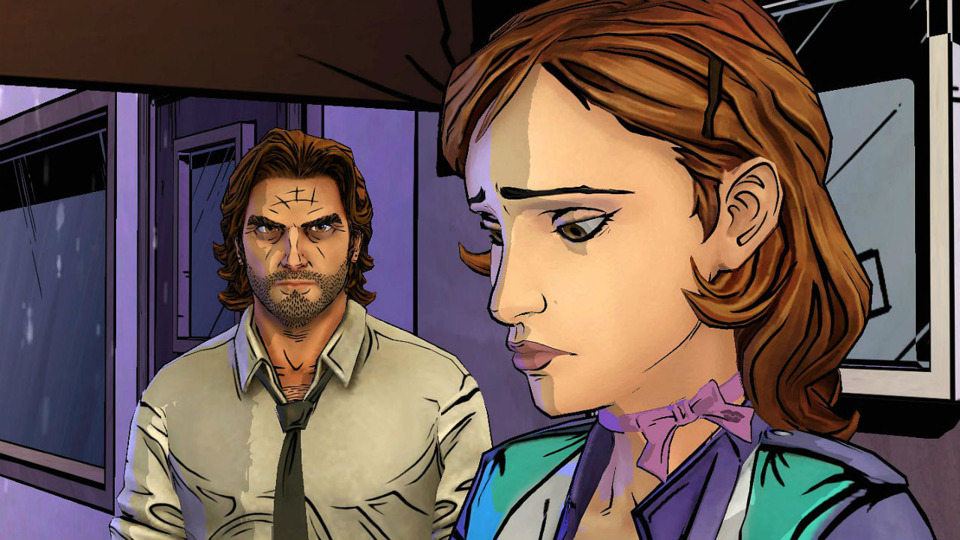
Random Notes:
- If you want a bit more dialogue on what takes place at the very end of the game, I'll just put it out there that I chose to run after Nerissa after she tells you what she tells you. The implication that she may have been Faith in glamour all along is an interesting detail, and one that forced me to go back and replay a couple of the early episodes just to try and grasp which hints toward this I'd missed. I suppose I should have known, given Faith's backstory and the constant use of glamours by various Fables. I'm curious if it took anyone else besides me a little time to actually figure out what the reveal was, or if most people understood it right away and I'm just a big dummy.
- No big list of bullet points this time around. Just wanted to thank everyone for sticking with me for this partial season of recaps. Again, I'll have a full review of the season up on the site soon, so keep an eye out for that. If you've got any feedback about how I've gone about covering these episodes, feel free to leave it in the comments. And if you're looking for longer, spoilery discussion, be sure to check out the thread on our forums for precisely that. Thanks again. Awoo!